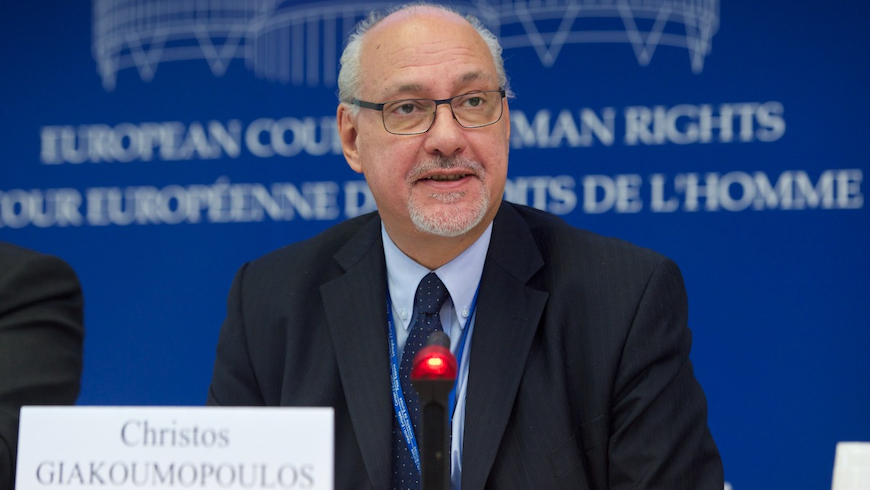Speech by Christos Giakoumopoulos
Judgments of the European Court of Human Rights and Russian Law: 20 years of Dialogue and Interaction
16 May 2018, Saint-Petersburg International Legal Forum
Dear Minister Konovalov,
Distinguished judges,
Excelencies,
Ladies and Gentlemen,
I am delighted to be back at the Saint-Petersburg Legal Forum on such a significant occasion and at such an important moment for both Russia and the Council of Europe.
As it has just been said, 20 years have passed since Russia’s accession to the European Convention on Human Rights – the continent’s main Convention in terms of its constitutional importance and pan-European outreach.
Within those 20 years Russia has changed impressively, and so too has the Convention system.
They have gone this way together. And it would not be an overstatement to say that they owe quite a lot to each other.
Indeed, the 20 years have seen a complete overhaul of the Russian legal system with the introduction of new legal concepts, new rights and new obligations. The two main pillars in this process were the Russian Constitution on the one hand, and the European Convention on the other.
As a result, the Russian Federation is governed today by a corpus of law which is modern, effective and, I should add, intrinsically European. I would like to share with you my personal view, that Russia has never been so modern and European as we see it today. I am happy to say so in Saint-Petersburg, which was reportedly established by Peter the Great as “a window to Europe”.
Likewise, the Council of Europe gained a lot with the Russian Federation’s membership and the European Convention also owes much to Russia.
As every member State, Russia enriched the Convention system with new cases, new legal issues, but also with new legal initiatives and new implementing practices, not least through the abundant case-law of Russian courts. The Russian Constitutional and Supreme courts are the leaders in referring to the Convention and the European Court’s case-law in their adjudication, and the two distinguished vice-presidents will no doubt confirm it in their respective interventions.
Through Russia's application of the Convention over the past 20 years, its impact has been projected throughout a large part of Eurasia, thus extending the European legal space far beyond Europe’s geographic borders. The fact that the European Court of Human Rights is by far the most frequently quoted judicial body in the world should also be attributed to the practice of numerous Russian courts which apply the Convention on a daily basis.
Admittedly, the pan-European legal space between Vladivostok and Lisbon cannot be anything than “work in progress”, our standing challenge which the Council of Europe and Russia ventured into 20 years ago.
I dare say, nonetheless, that this joint venture has already brought about tangible and unprecedented results.
* * * * * *
I would not speak much about the results because I think that they speak for themselves.
You have in your hands a very illustrative booklet which highlights a handful of 20 cases with major beneficial impacts on Russian law. This is only a snapshot of what the Convention has meant for Russia over the 20 years. Indeed, the recollection of such cases could go on by hundreds in all legal areas.
I would stress, however, that the Convention’s significance for all 47 member States is far beyond case numbers, however impressive they could be.
The Convention’s paramount importance is that it provides greater Europe with a common legal basis for successful cooperation among the 47, bringing all European countries to a closer union around the same fundamental values.
If you take the Convention away, our common values would desperately erode and the continent dangerously fragmented by new dividing lines. We absolutely need the Convention for the sake of peace in Europe. That is the major lesson learned by Europe from the Second World War, in which Russia itself played a paramount role.
* * * * * *
How to safeguard and strengthen the results we have achieved within the last 20 years? The only way to do so is to meticulously apply the Convention’s main methods: interaction and dialogue.
Of course, the Convention system takes its strength in its unique judicial machinery. The judgments of the European Court of Human Rights are binding for all States and subject to execution under supervision of the Committee of Ministers of the Council of Europe.
Yet, the 20 years of Russia’s participation in the Convention system have amply demonstrated that the major success stories have been achieved through a continuous dialogue and interaction with our main partners, most of which are represented on this distinguished panel: the Constitutional and Supreme Courts, Ministries of Justice and Foreign Affairs, the Presidential Council for Human Rights, the General Prosecutor’s Office and the Federal Ombudsman.
Convention issues arise on a daily basis and need to be discussed on a daily basis between all the Convention actors. This is how the great majority of issues find themselves successfully resolved at the national level without even reaching Strasbourg. This demonstrates that the Convention is indeed embedded, albeit at various degrees, in the 47 European States. Russia is not an exception.
When some cases end up with the Strasbourg Court finding violations, this opens a way for further dialogue and interaction to resolve possible shortcomings in domestic law.
Once again, I would like to praise Minister Konovalov’s view that some 98 % of judgments in respect of Russia do not raise any controversy with the Russian legal system. It roughly corresponds to our assessment. In some cases implementation takes time, but there is no opposition or confrontation. Some issues are sensitive, but no one is unmanageable.
In some very rare cases major controversies arise with regard to the implementation of Strasbourg judgments. Those cases are well-known and I will not repeat them once again. I would rather say this:
With all due regard to the damaging effects of such controversies, they do by no means prevail over the outstanding positive achievements of Russia’s participation in the Convention system over the past 20 years. Our discussion today will demonstrate it time and again.
Furthermore, no such issue is unsolvable if we stick to the Convention’s main method: dialogue and interaction. Numerous intricate cases against a variety of states were thus resolved in a satisfactory manner.
In this regard, I would like to welcome our recent discussions with the Russian authorities and other parties on the issue of jurisdiction in so-called Transnistrian cases. We are ready to discuss other tough issues which have just been mentioned by the Minister with a view to a viable solution.
One condition applies, however: no party must shut the door which would put an end to the dialogue and constructive interaction; I have to insist, this condition applies to all: the State authorities and the Council of Europe’s institutions, including the Court and the Committee of Ministers.
May this dialogue and interaction continue for the benefit of all our 47 member States and their 800 million citizens!




